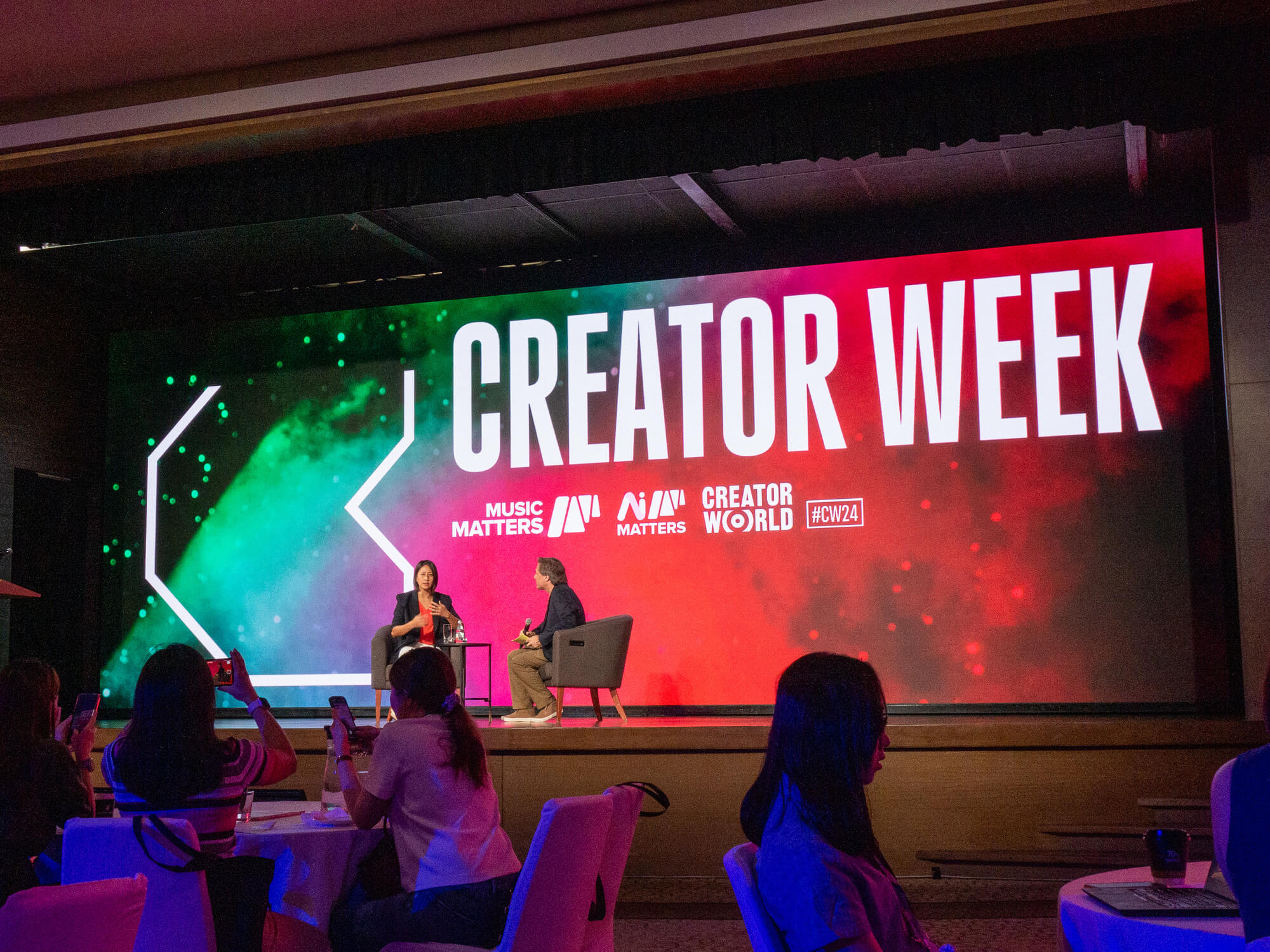AI and the future of creativity: Takeaways from Music Matters 2024
Dive into hot button topics like the rise of virtual influencers and career sustainability in the age of AI.

Image: Crystal Koe
Artificial intelligence took centre stage as creators, music professionals and industry leaders descended on the sunny city-state of Singapore this week for the 19th edition of Music Matters. This year, the music conference returns as part of the inaugural CreatorWeek, a new festival spotlighting and celebrating Asia Pacific’s music and creator economy.
Speakers at the 2-day event (8-9 May) included Akhila Shankar, head of TuneCore South Asia; Mike McCabe, managing director of Epic Games; Meng Ru Kuok, CEO & co-founder of Caldecott Music Group; Reggie Ba-Pe, CEO and founder of Alias; Accenture managing director Caspar Schlickum; and Johnathan Chua, Co-Founder and CEO of GRVTY Media.
AI’s transformative potential
Thursday’s programme began with a discussion on the exponential growth of Generative AI across creative industries and the massive ecosystem that’s been built on the technology.
“Once in a while in history, you see technology that will potentially change lives. I think we are at that stage right now,” said Kevin Chan, chief partner officer of Microsoft Singapore. He explained that the magic of Generative AI lies in the way it allows creators — both big and small — to “do much more with less”. For musicians, this means freeing up precious time to focus on what matters to them: making music.
“Most people don’t like to do the kinds of tasks that Gen AI’s really good at doing in the process. The miserable, repeatable, repetitive tasks,” said Accenture managing director Caspar Schlickum. Addressing sceptics, he argued that AI has been in development and in use (albeit more implicitly) for decades, and that “what happened with ChatGPT is [just] that AI got a UI”. With the democratisation of AI, he argues, a broader range of creators can now produce higher-quality content due to the lowered costs of projects.
Building a sustainable career in the age of AI
With AI looming large, how can you ensure longevity in your career as an artist and content creator?
In this session, Jako de Leon (Creators and Influencers Council of the Philippines), Johnathan Chua (GRVTY Media), and Mohamad Fattal (Alfan) stressed the importance of leveraging AI while cautioning against an over-reliance on the technology.
Chua, a seasoned podcaster (The Daily Ketchup), spoke of the “difference between creating content and creating a brand”; AI can do the former, but the latter is what’s needed to build a long-lasting career, he says. Artists should thus focus on developing their own unique identity and brand while creating content because, eventually, “the algorithm will adjust to bring in more humans”.
The speakers also touched on AI abuse in music — such as inputting a singer’s voice into an AI model to generate songs without their approval — and the need for more open conversations about its dangers as well as greater community-based efforts to protect artists from bad actors.
Crafting ‘experiences’ in the creator economy
Relationships take work, and artist-fan relations are no exception. Dylan Harari, global head of creators at content subscription platform Fanfix (aka the family-friendly version of OnlyFans) offered insights into subscription-based models for creators, emphasising the importance of direct one-on-one engagement or ‘experiences’.
While the concept is hardly new (think artist Meet-and-Greets, backstage passes, paid video recordings), the form it takes on has certainly evolved. For example, Fanfix has a pay-to-message feature that allows fans to pay between $3 to $500 to chat privately with their favourite artists. Describing creator subscriptions as modern-day e-commerce, he shared how curating the right “experiences” can create new revenue streams for artists while strengthening the bond they have with their fans.
Asked about the impact of AI on the creator economy, Harari surprised the audience, saying that the technology is not going to change things drastically: “I don’t think it’s going to be as disruptive as people think it’s going to be,” he said. The executive also expressed scepticism towards fully AI-generated avatars because “you still need the sprinkle of human touch”.
Rise of the ‘virtual’
Later in the day, Alias founder Reggie Ba-Pe, Kobe CEO Evangeline Leong, and VP of business development at TheSoul Publishing Patrik Wilkens explored how virtual pop stars like Polar are poised to upend the creator economy.
Last year, VTuber Ironmouse won the coveted Content Creator of the Year award at the Game Awards, which, according to Wilkens, signalled that markets are ready to embrace virtual influencers.
With AI, “everybody will be able to create avatars. The obstacle is to be relevant, to be authentic,” he said. Leong also emphasised that while AI is capable of streamlining processes and generating content, it cannot replicate the unique chemistry between creators and their followers.
On the whole, discussions about avatars, VTubers, and virtual experiences highlighted a paradigm shift in creative expression facilitated by AI. There is a general consensus that AI is here to augment rather than replace human creativity.
Learn more at Creator Week.